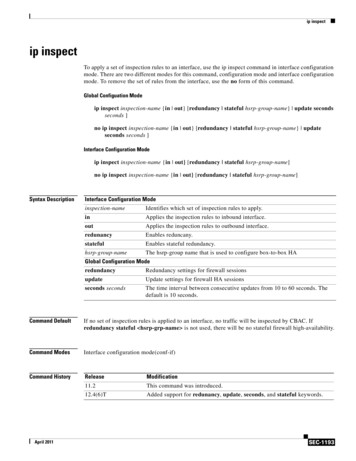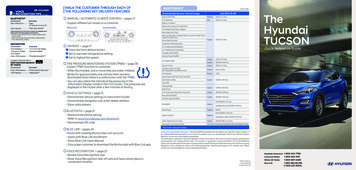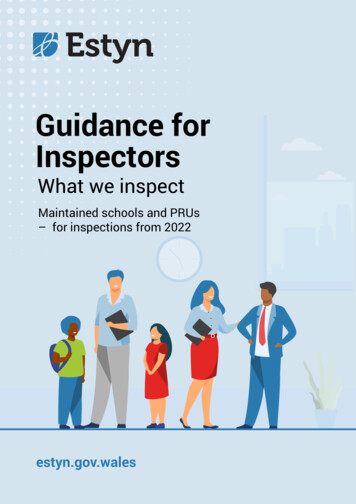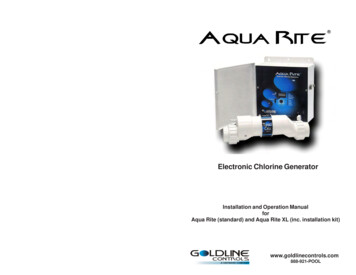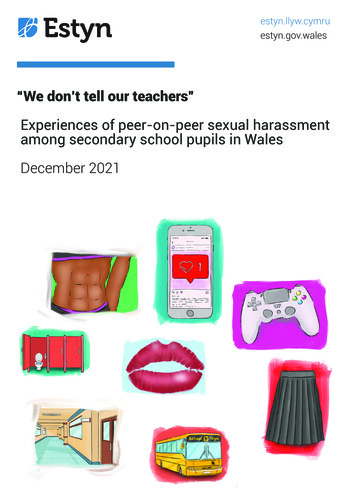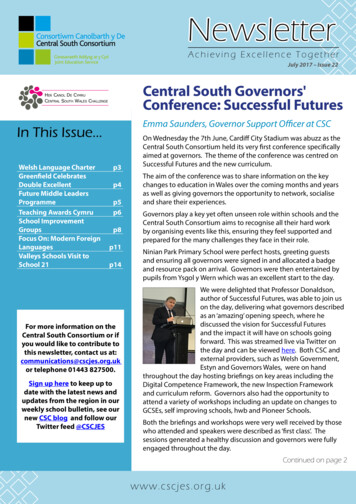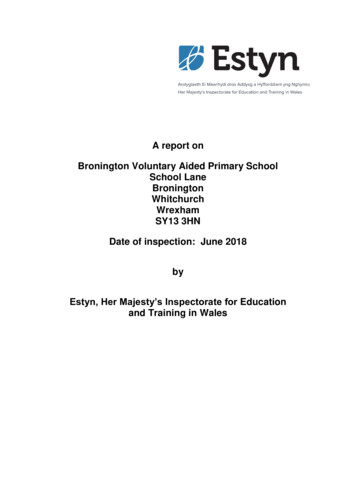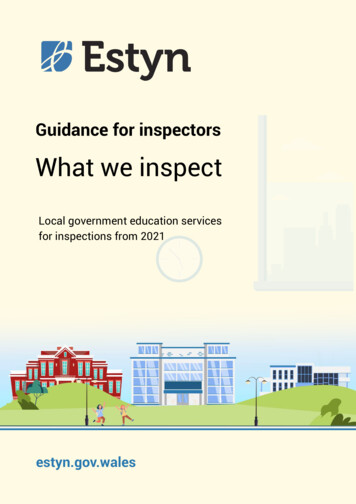
Transcription
Guidance for inspectorsWhat we inspectLocal government education servicesfor inspections from 2021estyn.gov.wales
Every possible care has been taken to ensure that the information in this document isaccurate at the time of going to press. Any enquiries or comments regarding thisdocument/publication should be addressed to:Publication SectionEstynAnchor CourtKeen RoadCardiffCF24 5JW or by email to publications@estyn.gov.walesThis and other Estyn publications are available on our website: www.estyn.gov.wales Crown Copyright 2021: This report may be re-used free of charge in anyformat or medium provided that it is re-used accurately and not used in amisleading context. The material must be acknowledged as Crown copyrightand the title of the report specified.This document is also available in Welsh.
ContentsPageIntroduction1Purpose of this guidanceLegal basis and policy background for the inspection of localgovernment education services11Part 1: Inspection arrangements6IntroductionContextPrinciples of inspectionInspection mind-setCode of conduct for inspectorsExpectations of providersHealth, safety and wellbeing issuesResponding to a safeguarding allegationApproach to inspectionThe Virtual Inspection RoomThe inspection teamInspection scheduleContacting the local authority before the inspectionSurveysPreparing local inspection questionsPlanning the inspection and preparing the teamPreliminary activitiesDuring the core inspection weekAfter the inspectionAssuring the quality of inspections667889910101111121213131414151921Part 2: Inspection areas and reporting requirements22The local government education services frameworkAbout the local authoritySummaryRecommendations22222323Inspection areas241 Outcomes2 Education services3 Leadership and management242935Part 3: Follow-up arrangements42
Guidance for the inspection of local government education servicesIntroductionPurpose of this guidanceThis guidance sets out the way we will conduct inspections of localgovernment education services (LGES) from September 2021.Local government education services include education services provided on behalfof a local authority by: a regional consortium or other partnership between two or more local authorities another local authority another organisation commissioned by the local authority (for example, avoluntary organisation or a private company)This guidance sets out the inspection arrangements for local government educationservices. It also sets out how we will follow-up with local authorities causingsignificant concern.Local authorities and their partners can use this guidance to understand how we willconduct inspections. It may also help them self-evaluate and plan for improvement.You will find more information and guidance about inspections on our website:www.estyn.gov.wales.Legal basis and policy background for the inspection of local governmenteducation servicesInspections of LGES are carried out under Section 38 of the Education Act 1997which provides that Her Majesty’s Chief Inspector of Education and Training in Wales(HMCI) ‘may, and, if requested to do so by the Secretary of State, shall, arrange forany local authority to be inspected’. Such an inspection ‘shall consist of a review ofthe way in which the authority are performing any function which relates to theprovision of education for (a) persons of compulsory school age (whether at school orotherwise) or (b) for persons of any age above or below that age who are registeredas pupils at schools maintained by the authority’.Other aspects of local authority provision are subject to inspection under a range oflegislation, including the functions conferred on them under sections 25 and 26 of theLearning and Skills Act 2000 relating to education, training or youth support services(within the meaning of section 123 of the Learning and Skills Act 2000).The Children Act 2004 introduces a duty on local authorities and their partners to cooperate to improve the wellbeing of children. As far as local authorities areconcerned, the inspectorate is given the powers to review a local authority’s functionsrelating to Section 51 of the Act, namely in co-operating to improve wellbeing andproducing children and young people’s plans where these functions relate toeducation, training or youth support services.2
Guidance for the inspection of local government education servicesSection 51 of The Children Act 2004 changes the Education Act 1997 so that ‘Aninspection of a local education authority in Wales under this section shall consist of areview of the way in which the authority are performing: any function conferred on them in their capacity as a local education authority the functions conferred on them under sections 25 and 26 of the Learning andSkills Act 2000 relating to education, training or youth support services’Local authority inspections will be conducted by Her Majesty’s Inspectors ofEducation and Training (HMI) in Wales. In response to the Children Act 2004requiring inspectorates to work more closely together, HMI may be joined byinspectors from Care Inspectorate Wales (CIW) and Health Inspectorate Wales(HIW). HMI may also be joined on inspections by additional inspectors (AI)authorised under paragraph 2 of Schedule 1 of the School Inspections Act 1996.HMCI may, under Section 41 of the Education Act 1997, as amended by the PublicAudit (Wales) Act 2004, request Audit Wales to assist with any inspection underSection 38. HMCI and Audit Wales have agreed that:i Audit Wales will contribute to those inspections of local authorities in which theirexpertise will add to the rigour and effectiveness of the inspectionii Audit Wales will contribute to the regular collection and analysis of local authorityperformance dataiii as partners in the inspection of local authorities, Audit Wales and theinspectorate may use local authority inspection reports to produce other reports,surveys and studiesThe inspection of local authority education services for children and young people willcover the statutory functions of the local authority, including the local authority youthservice.In addition, it will include inspection of the partnership arrangements for youthsupport services (YSS). These partnership arrangements are those led by the localauthority to plan, co-ordinate and oversee all youth support services in an area.These partnership arrangements are set out in the Learning and Skills Act 2000, andthe Welsh Government policy as described in Extending Entitlement and associatedguidance 1. Under the Children Act 2004 2, this statutory responsibility for partnershipplanning can be fulfilled through a young people's partnership, children and youngpeople’s partnership or a framework partnership.Youth support services are those services for young people aged between 11 and25, which are provided, procured or facilitated by a local authority and identified inthe partnership plan and/or self assessment report. They are those, which in theopinion of the Welsh Government will encourage, enable or assist young persons12Extending Entitlement and the accompanying directions and guidance for its implementation extendthe legal basis in Wales for the provision of youth support services. In these documents, the WelshGovernment has set out frameworks within which local authorities in Wales will provide youthsupport services.Stronger Partnerships for Better Outcomes Guidance (2006) National Assembly for Wales CircularNo: 35/2006.3
Guidance for the inspection of local government education services(directly or indirectly) to: participate effectively in education or training; take advantage of opportunities for employment; or participate effectively and responsibly in the life of their communities. 3In addition to referring to those partnership arrangements for youth support services,the term partnership is used more generally throughout this guidance. Nationalpolicy and the drive to improve services and be more cost effective means that localauthorities are increasingly working in partnership and integrating services. In thisguidance, ‘partnership’ is used to refer to any joint working arrangements wherepartners, who are otherwise independent, co-operate to achieve a common goal.The term will not be used to describe consultative arrangements, professionalnetworks or contractual arrangements.The Local Government and Elections (Wales) Act 2021 has various implications forhow local authorities work. Part 6, ‘Performance and governance of principalcouncils’ in particular includes several duties that may affect how local authorities areinspected and how we work with other inspectorates and regulators. Our inspectionswill take account of any regulations or statutory guidance introduced in relation to theAct.The School Standards and Organisation (Wales) Act 2013 reinforces the powers ofentry and right to documentation that is enshrined in previous legislation.The Additional Learning Needs and Education Tribunal [Wales] (ALNET) Act 2018,supports the Welsh Government’s aim to create a fully inclusive education systemwhere all learners are inspired, motivated and supported to reach their potential. Thepriority on the additional learning needs (ALN) system is on early intervention,ensuring that needs are identified early, that the right provision is put in placepromptly, and that there is multi-disciplinary work to support learners and delivereffective and prudent interventions.Under the ALNET Act, local authorities will be responsible for learners with ALN from0 to 25, ensuring that they can access suitable education or training, includingcompulsory education and specialist post-16 education or training where necessary.The Act and accompanying ALN Code introduce a range of new statutory duties forlocal authorities that will be phased in over a three-year implementation periodstarting in 2021.The Well-being of Future Generations (Wales) Act 2015 and Local Government(Wales) Act 2015 support the approach and arrangements for the inspection of localauthorities either by individual inspectorates or jointly between us, Audit Wales andCIW.Although it is not a legal requirement, this guidance handbook also takes account ofthe United Nations Convention on the Rights of the Child, adopted by the WelshGovernment in 2004 as the basis for policy-making for children and young people.3Extending Entitlement: supporting young people in Wales Report by the Policy Unit The NationalAssembly for Wales 2000, p83.4
Guidance for the inspection of local government education servicesThe regionalisation of education services is covered by Welsh Government’sNational Model for Regional Working. While the document sets out the government’sexpectations, it is not statutory. In January 2021, the government published ‘Schoolimprovement guidance: framework for evaluation, improvement and accountability’for consultation. If introduced, this guidance would have implications for the work oflocal authorities and regional consortia and would be taken into account ininspections.5
Guidance for the inspection of local government education servicesPart 1: Inspection arrangementsIntroductionThis section is set out in a way that reflects the sequence of work before, during andafter a core inspection.The reporting inspector (RI) is responsible for the conduct and management of theinspection and for the inspection report. While this guidance focuses mainly on therole of the reporting inspector, all team members must comply with the sameinspection requirements.ContextThis guidance relates to the core inspection of local government education services.We regularly inspect aspects of local government education services through avariety of other activities. Some of this inspection work results in publishedevaluations, while other activity does not. The table below provides more detail.Inspection activityLocal authority link inspector (LALI)work. Each local authority has two LALIs.They meet senior officers and electedmembers in local authorities to challengethem about their work to improve educationoutcomes. LALIs may meet leaders ofeducation providers and directly observecouncil meetings. Through the year, wereceive communication from learners,parents and other stakeholders about localgovernment education services. LALIs willtake this into account in their discussionswith local authorities.FrequencyTermlyOutcomeOral feedback duringvisits. LALI workinforms otherinspection activity withthe local authority andits educationproviders.Regional link inspector (RLI) work. Wehave two RLIs for each of the educationconsortia. The RLIs meet regularly withsenior representatives in the region.TermlyOral feedback duringvisits. RLI workinforms otherinspection activity withthe regionalconsortium and itsassociated localauthorities andeducation providers.Oral feedback duringvisits. National reportsfeature individual localauthorities or regionalconsortia with goodpractice.Thematic reports. Each year, the WelshAnnuallyGovernment asks us to produce nationalreports on a range of themes. We will oftenvisit a sample of local authorities orconsortia or survey all local authorities orconsortia as part of this work.6
Guidance for the inspection of local government education servicesTopical reports. We choose to focus on aspecific aspect of local governmenteducation services and will evaluate thistopic across all local authorities or allconsortia.OccasionalWritten feedback toeach local authority orregional consortium,as appropriate. Mayalso contribute tonational reports or ourannual report.School organisation proposals. We arerequired to evaluate all school organisationproposals submitted by local authorities.In line withsubmissionsfrom localauthoritiesWe produce a formalresponse which isincluded in the‘consultation report’published by theproposer, but this isnot published on ourwebsiteImprovement conferences. We initiallyused improvement conferences to supportlocal authorities outside of the inspectioncycle where aspects of their educationservices caused concern. The approachhas been used from September 2018 tosupport local authorities identified ascausing significant concern following aLGES inspection.Scheduledas requiredA letter is sent to thechief executive of thelocal authorityfollowing animprovementconference detailingour views on areas forconcern.Inspections of schools and othereducation providers and related followup activity. Inspectors pick up usefulinformation about the quality of challengeand support provided to the provider by thelocal authority or regional consortium tobring about improvement.OngoingFindings informinspection activity withthe local authority andits regionalconsortium.During a core inspection of local government education services, we will takeaccount of the inspection activity described above along with any other relevantinspection work we carry out that is not included above.Principles of inspectionWe will: ensure that inspection is of high quality and responnds to the needs of alllearners ensure that judgements are secure, reliable and valid , involve the local authority fully in the inspection process, including the use ofnominees use the local authority’s self-evaluation and improvement planning work as thestarting point for the inspection and to inform questions about education services include peer inspectors in the inspection process7
Guidance for the inspection of local government education services keep to a minimum any requirements for documentation and preparation by thelocal authority evaluate evidence about the perspective of children and young people and otherstakeholders apply the principle of equality for Welsh and English to all our inspection work,providing bilingual services in line with the practices of the local authoritiesinspected. be constructive in identifying and supporting local authorities with importantareas for improvement contribute to joint assessments and reports with other inspection, audit andregulatory bodies as required by Welsh Government legislation.Inspection mind-setOur approach to inspection is: Fair and impartial – this means that we work to be independent, objective andbalanced. We are robust and consistent in our work. We weigh the evidenceand its significance to provide an honest, credible and accurate view of theprovider’s strengths and weaknesses. Supportive – we work to guide providers to implement improvements that benefitlearners. We encourage innovation and recognise good intentions. We arefriendly but always professional in our approach. We support educational reform.We work hard to develop meaningful relationships with providers and local andregional organisations as part of a Wales-wide support network. Reflective – we are open-minded. We listen to a wide range of stakeholders andreflect on their responses. We are thoughtful, measured and careful. We planopportunities to think carefully about the inspection findings and to discuss themwith others in the team. Transparent – we are well informed and communicate clearly, directly andsuccinctly. We use efficient and effective inspection methodologies to respond tothe provider’s unique situation. We plan inspection activity and report onstrengths and weaknesses in ways that reflect the particular circumstances ofeach individual provider. As a result, our actions promote trust and respect.Code of conduct for inspectorsOur code of conduct explains how inspectors embody the inspection mind-setthrough their actions. Inspectors should uphold the highest possible standards intheir work. All inspectors have to meet the standards in our code of conduct.When conducting the inspection, inspectors will: carry out their work with integrity, courtesy and sensitivityevaluate the work of the local authority objectivelyreport honestly, fairly and impartiallycommunicate clearly and openlyact in the best interests of learners8
Guidance for the inspection of local government education services respect the confidentiality of all information received during the course of theirworkIt is important that inspectors evaluate the effectiveness of provision and leadershipon their contribution to outcomes and not on the basis of any preferences forparticular methods. The key to the evaluations is whether the methods andorganisation are fit for the purpose in supporting all learners to achieve highstandards and high levels of wellbeing.Inspectors should inform us of any perceived or actual conflicts of interest as soon asthey receive notification that they are on the inspection team.Expectations of providersIn order that inspection is constructive and beneficial, it is important that inspectorsand providers establish and maintain a professional working environment based onmutual courtesy, respect and professional behaviour. We expect inspectors touphold the our Code of Conduct. This is what we expect providers to do in return: be courteous and professionalapply their own codes of conduct in their dealings with inspectorsenable us to conduct the inspection in an open and honest wayenable us to evaluate the provision objectively against the frameworkuse our electronic systems for managing inspections as requiredprovide evidence that will enable us to report honestly, fairly and reliably aboutthe local authoritymaintain a purposeful dialogue with our reporting inspector and other inspectorsrecognise that we need to talk to elected members, officers, learners, and otherstakeholders without the presence of a manager or senior leaderhighlight any concerns about the inspection in a timely and suitable mannerthrough the nominee or senior leader, preferably while our team is on sitework with us to minimise disruption and stress throughout the inspectionensure the health and safety of inspectors while on their premiseskeep the meetings and inspection findings confidential until the publication of thereportAt the point of the inspection notification, the local authority should review themembership of the inspection team. It is the responsibility of the local authority toimmediately highlight any perceived or actual conflicts of interest prior to the start oftheir inspection.Health, safety and wellbeing issuesInspectors will carry out inspections in accordance with our guidance on inspectingsafeguarding. If they observe anything that they think constitutes, in their opinion, areal danger to the safety of staff, visitors or learner, they should alert the Director ofEducation. In all cases, inspectors should make a separate electronic note of thethreat and that they informed managers of it. Inspectors should report on obviousrisks relating to health, safety and wellbeing under inspection area 3 (leadership andmanagement). Where these risks are a serious concern, inspectors should include a9
Guidance for the inspection of local government education servicesrecommendation in the report. We will send a wellbeing letter to the local authorityasking them to outline how they will address the shortcoming.Responding to a safeguarding allegationIf an inspector is alerted to an allegation/suspicion in respect of a child, young personor vulnerable adult, they should follow the procedures as set out in the currentversion of ‘Estyn’s policy and procedures for safeguarding’, which is available on ourwebsite.Approach to inspectionThis guidance sets out the procedures for core inspections for local governmenteducation services. These procedures will be complemented by follow-up activity inlocal authorities that are identified as causing significant concern, and this is coveredin Part 3.The starting point for inspection is the local authority’s evaluation of its ownperformance, supported by relevant evidence. Local government education servicesshould be regularly evaluating their work as a natural process in their businessimprovement cycle. We do not expect a local authority to prepare a self-evaluationreport for an inspection and will be critical of leaders if such a report is created solelyfor this purpose. Self-evaluation is a very important process for improvement.Honest and thorough self-evaluation, alongside diligent risk assessment, helps localauthorities to sustain and further develop good services, plan for improvement wherenecessary and make informed decisions about the efficient use of resources.Inspectors will not inspect or evaluate all education services during a core inspection.After reviewing key documentation from the local authority, such as performancereports to elected members and strategic plans, alongside our information about thelocal authority, inspectors will choose specific aspects of education services toevaluate during the core inspection. Inspectors will do this by drafting ‘localinspection questions’. Inspectors will share these questions with the local authorityand ask for their views on their suitability. Inspectors will take account of feedbackfrom the local authority. The final decision about the wording and focus of the localquestions will be made by our inspectors.Inspectors will sample evidence to test the local authority’s own evaluation. Theprogress learners make from their starting-points and the standards they achieve arekey measures of the quality of the education they have received and of theeffectiveness of the leadership and management in the authority. Inspection willfocus on the needs of learners, their wellbeing and attitudes to learning and theimpact that the services funded or coordinated by the local authority have on them,directly or indirectly.The inspection period and number of inspectors may vary according to the size of thelocal authority, the way in which local government education services are provided inthe area and the number and nature of the inspection questions.Inspection reports will cover all inspection areas and reporting requirements covered10
Guidance for the inspection of local government education servicesby the inspection framework outlined in Part 2.All inspections are carried out in line with our Welsh Language Policy, available fromthe inspectorate’s website www.estyn.gov.wales and supported by supplementaryguidance on inspecting the development of Welsh language skills.Core inspection activities such as interviews, focus groups and team meetings areusually carried out face-to-face. Some activities may suit a remote approach usingsecure virtual meeting software or a telephone call. Activities carried out remotelywill be used with discretion, either where circumstances or rules require it, or where itis convenient and efficient to do so without impeding the effectiveness of theinspection process. For example, as part of the preliminary activities, we may set upan online meeting for a group of headteachers instead of requiring them to travel asignificant distance to a central location.We will usually discuss and agree with the local authority which activities may suit aremote approach as part of the inspection planning process.The Virtual Inspection RoomWe will use an electronic system, called the ‘Virtual Inspection Room’ (VIR), formanaging many aspects of the inspection. It is a web-based system that allows localauthorities to upload information before the inspection and to download guidancefrom the inspectorate about the inspection process. The VIR is also the place wherelocal authorities can access the nominee’s guidance on preparing for the inspectionand on completing post-inspection questionnaires.The inspection teamOur inspection teams will be led by a reporting inspector. The reporting inspector willalways be HMI, with other team members drawn from among HMI and additionalinspectors. Additional inspectors may be on secondment or contract to theinspectorate. Each team will also have two peer inspectors. One peer inspector willbe a senior leader from a local authority or regional consortium outside of their ownlocal authority or region. The other will be a head of a service area in a localauthority or regional consortium.At least one of the local authority’s link inspectors (LALIs) will normally be part of theteam and one LALI will usually act as the deputy reporting inspector.The inspection team will always include an inspector from Audit Wales. Dependingon the nature of issues identified in pre-inspection evidence, the team may requestan inspector from Care Inspectorate Wales (CIW) or Healthcare Inspectorate Wales(HIW) to join the Estyn inspection team. If appropriate the reporting inspector willcontact CIW or HIW before the inspection to come to a view whether CIW or HIW willneed join the inspection team.The reporting inspector manages the inspection team and is the first point ofreference for everyone involved in the inspection.The local authority will be invited to select a senior member of staff to take on the role11
Guidance for the inspection of local government education servicesof nominee, to work with the inspection team. The nominee should have sufficientseniority and knowledge of the local authority’s work to act as a link between thelocal authority and the inspection team.Inspection scheduleThe programme of LGES inspection began in September 2018. We initially plannedto inspect all local authorities over a four-year period. Due to COVID-19, theschedule has been severely disrupted. We will inspect between four and six localauthorities each year during the next three years to complete the current cycle ofinspections.The programme will be discussed with other inspection, audit and regulatory bodiesto help avoid duplication and take advantage of opportunities to work jointly withAudit Wales, CIW or HIW.Contacting the local authority before the inspectionWe will notify a local authority of a LGES inspection ten weeks in advance.Once the local authority has been formally notified, one of our inspection coordinators (IC) will contact the local authority by telephone to set up thearrangements for the inspection. During this discussion, the IC will: discuss an outline programme for the inspection including the process fordiscussing local inspection questions and the on-site inspection work share the draft local inspection questions discuss the specific information required before the inspection and make thearrangements for receiving it in electronic form through the VIR ask if there are any issues or risks the team should be aware of and ask for ageneral health and safety briefing for the team at the start of the inspection establish whether the local authority wishes to have a nominee and, if it does,agree the role of the nominee and confirm that the nominated officer is ofsufficient seniority and has completed the required training arrange the availability of supporting evidence discuss the timetable requirement for interviews organise any domestic arrangements such as a base room for the inspectors,parking and internet access ensure that there are agreed procedures for addressing any concerns orcomplaints that might arise during the course of the inspection set up the arrangements for feeding back the inspection findings agree the arrangements for completing the post-inspection questionnaire inform the local authority that the key arrangements will be confirmed in writingThe IC will request the following information from the local authority through the VIRas soon as possible after the formal notification of the inspection: key background information on the local authority internal documents that feature the local authority’s views on aspects ofeducation outcomes, the quality of education services or the quality of leadershipand management of education services, such as reports to council, cabinet,12
Guidance for the inspection of local government education servicesscrutiny, the corporate management team, the Public Services Board or WelshGovernment. The focus should be on documents produced within the last 12months, but older documents may st
What we inspect estyn.gov.wales Local government education services for inspections from 2021. Every possible care has been taken to ensure that the information in this document is accurate at the time of going to press. Any enquiries or comments regarding this document/publication should be addressed to:
